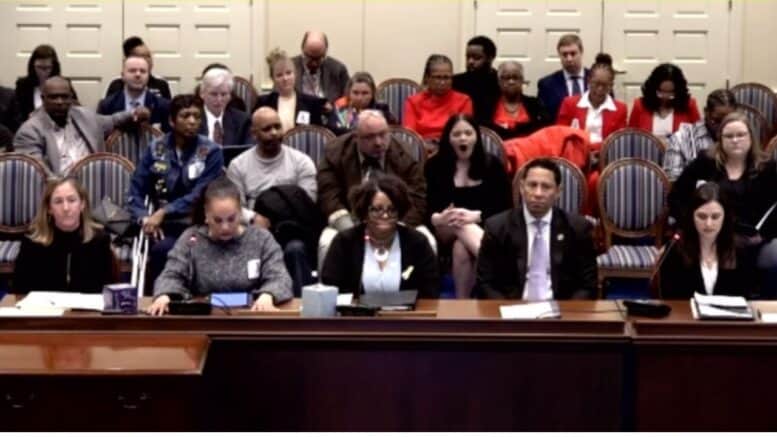A bill in the Maryland General Assembly aims to significantly limit the power of District Court commissioners to issue arrest warrants.
House Bill 21, sponsored by Del. Jackie Addison, D-Baltimore City, proposes removing the ability of private individuals to file applications for arrest warrants directly with District Court Commissioners. This would significantly alter the current process and increase the penalties for making false statements to officials.
Currently, commissioners can issue arrest warrants based on applications from private citizens, police, or prosecutors. Under the proposed legislation, commissioners could only issue warrants when the application originates from law enforcement or the prosecutor, probable cause exists, and certain conditions are met.
The bill also targets complainants who make false statements to District Court commissioners, proposing to increase the maximum prison sentence from six months to three years. This increase in the maximum prison sentence reflects a stricter stance on false reporting and the misuse of the commissioner system.
The bill aims to amend two specific sections of Maryland law: Article – Courts and Judicial Proceedings, Section 2-607, and Article – Criminal Law, Section 9-503.
What HB 0021 Proposes
HB21 follows a similar bill introduced in the 2024 legislative session, House Bill 1183, which ultimately failed to advance out of Committee. However, the discussions and debates surrounding the 2024 bill have significantly shaped the current proposed legislation.
Extensive written testimony presented during a March 5, 2024, hearing before the House Judiciary Committee illustrated the contentious divide over reforming the commissioner system.
HB21 seeks to restrict District Court commissioners’ ability to issue arrest warrants. Under the proposed amendments to Section 2-607:
Commissioners may issue arrest warrants only if:
- The application is filed by a police officer or a Maryland state’s attorney;
- Probable cause exists to believe the defendant committed the alleged offense.
And if one of the following conditions is met:
- The defendant previously failed to respond to a summons or citation;
- The defendant’s whereabouts are unknown, necessitating a warrant to bring them under court jurisdiction;
- The defendant is in custody for another offense;
- There is probable cause to believe the defendant poses a danger to another person or the community.
States Attorney’s Association, Ivan Bates, ACLU of Maryland Among Groups Backing Bill
In 2024, supporters of the changes, including the Maryland State’s Attorney’s Association (MSAA) and Baltimore City State’s Attorney Ivan Bates, emphasized the need to prevent wrongful arrests and ensure that only trained law enforcement personnel have the power to seek arrest warrants.
“I believe that this bill is crucial in enhancing the integrity of our legal system and safeguarding the rights of individuals.,” Bates said in his 2024 testimony.
“Additionally, the bill seeks to amend penalties for making false statements or reports to governmental officials regarding criminal activities or public safety concerns. By increasing the maximum imprisonment term from 6 months to 3 years and raising the maximum fine to $500, this legislation if made law will deter individuals from fabricating information that could lead to unnecessary investigations or legal actions.”
Olivia Spaccasi, Public Policy Program Associate for the American Civil Liberties Union of Maryland (ACLU of Maryland), testified in favor of HB 1183 on March 5, 2024, before the House Judiciary Committee, expressing concerns about the potential for abuse in the current system.”
Spaccasi highlighted a key concern: the potential for abuse in the current system.
She noted that citizen complaints comprise a significant portion of charging documents issued by District Court Commissioners, with some jurisdictions seeing rates as high as 60%. Spaccasi further argued that this practice can lead to wrongful arrests, as these citizen-initiated applications often lack proper investigation or review by law enforcement or prosecutors.
Marylanders Recount Harm Caused by Current District Court Commissioner System
Some individual Marylanders also provided powerful personal stories illustrating the harm caused by false applications filed through the commissioner system.
Rockville City Councilmember Dr. David Myles, a pediatrician, recounted a harrowing personal experience with the current Commissioner arrest warrant system.
He described in 2024 how he was wrongfully arrested at his own home based on a false accusation, an incident that left him traumatized and facing severe professional and personal consequences. This experience, Myles testified, underscored the urgent need for reforms to prevent the issuance of warrants based on unverified or false information, highlighting the potential for significant harm to individuals.
“The abuse of this process has profound personal and professional consequences for those victimized by it,” Myles told lawmakers in his written and virtual testimony.
Kimberly Lightner, a mother who found herself incorrectly listed as a fugitive after her ex-husband filed false accusations through a commissioner, described the fear and disruption the situation caused her family.
“On January 28, 2024, unbeknownst to me, the father of my son made four serious felony allegations, including child abuse, against me to the Prince George’s Commissioner,” Lightner testified before the Maryland House Judiciary Committee.
“With those allegations having been filed, all based on a series of false allegations filed against me three days earlier in a Petition for an Emergency Protective Order in a Custody matter, a warrant was issued for my arrest. No prosecutor or magistrate conducted any investigation. The Commissioner just issued warrants for my arrest. Just like that, I was facing up to 25 years in prison.”
Lightner described the agonizing experience of being separated from her son, the fear and confusion that ensued, and the ongoing trauma of living with the constant fear of another wrongful arrest.
Maryland Domestic Violence Groups Oppose Bill
Despite garnering significant support from law enforcement and some legal advocacy organizations, HB1183 faced considerable opposition from advocacy groups and legal experts who raised concerns that the changes could have unintended consequences for victims of domestic violence, sexual assault, and human trafficking.
The Maryland Network Against Domestic Violence (MNADV) in 2024 warned that restricting access to commissioners could remove a critical lifeline for victims in need of immediate protection.
“Victims escaping domestic violence need as many pathways to safety as possible,” stated MNADV in their testimony.
“Access to the District Court Commissioners is one of the pathways to safety utilized by victims of domestic violence in Maryland, and HB 1183 could put victims at greater risk.”
MNADV’s testimony highlighted the vulnerability of victims when leaving an abuser, emphasizing that removing the possibility of a commissioner-issued arrest warrant during this dangerous time could have devastating consequences, expressing concern that restricting access to commissioners could discourage victims from reporting abuse, fearing that the abuser would be immediately notified, potentially leading to further violence.
Other advocacy organizations like the House of Ruth Maryland and TurnAround, Inc. echoed MNADV’s concerns.
They stressed that abusers often escalate their behavior when victims attempt to leave or seek help, making it essential to have multiple avenues for securing protective orders and holding offenders accountable.
“The ability to apply for a statement of charges with a District Court Commissioner is an important safety tool for victims of domestic violence, the House of Ruth said in its testimony.
“Many victims are unable to call 911 during an abusive incident, either because the abuser takes away or destroys their phone or threatens to kill the victim if they attempt to call 911. Their only recourse in such instances is to go to a District Court Commissioner at the first safe opportunity to do so and apply for a statement of charges.”
HB 1183’s opponents also highlighted how the proposed changes could disproportionately impact marginalized communities that may have fraught relationships with law enforcement due to historical abuses and systemic inequities.
While acknowledging the need to address misuse of the commissioner system, the Maryland Office of the Public Defender suggested that increasing penalties for false statements may not be an effective solution. The office contended that unequal enforcement of such laws could worsen disparities in the criminal justice system.
Click the following link to read the full witness testimony on HB 1183
HB 21 Heads to House Judiciary Committee for a Second Look
As the House Judiciary Committee weighs the merits and drawbacks of HB21 during this annual legislative session, it faces a complex challenge of balancing the need to safeguard against abuses with the preservation of critical access to protection for Maryland’s most vulnerable residents.
Proponents argue the bill represents a vital step toward preventing wrongful arrests, increasing accountability, and bolstering public trust in the legal system. They point to cases where false complaints filed through commissioners have upended lives and wasted public resources.
However, opponents caution that lawmakers must be careful not to undermine core protections in their zeal for reform. They emphasize the importance of providing multiple pathways for victims to seek help and hold abusers accountable, particularly given the complex dynamics of domestic violence and sexual assault.
As the legislative process unfolds, observers expect robust debate over amendments to refine the bill’s approach. Some have suggested creating exceptions to allow commissioner-issued warrants in cases involving domestic violence, sexual assault, or stalking.
Others have proposed strengthening penalties for false statements only in cases involving elected officials or those that result in significant expenditures of public funds to investigate rather than a blanket enhancement.
Lawmakers will also likely examine strategies to improve commissioners’ training and oversight to address errors and abuses without entirely eliminating their role.
The House Judiciary Committee is now responsible for determining this bill’s fate.
To effectively shape Maryland’s future, the Committee must thoroughly evaluate the concerns raised by all parties involved. The outcome will have significant ramifications for the state’s legal system and the delicate balance between protecting the innocent and securing justice for the most vulnerable.
The first hearing for House Bill 21 is scheduled for Jan. 28th, 2025, at 1:00 p.m. in Room 101 of the Taylor House Office Building in Annapolis, Maryland.




